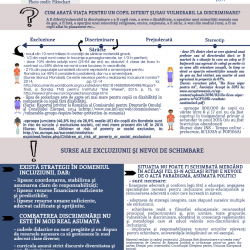The system’s Failure = The Subtle Discrimination of the Children
It is morning. I join the crowd of people walking rapidly to get to work or to take their children to school. Still sleepy or mopish, the children seem to hang off their parents’ hands, as if joining in a collective hanging. What always catches my eye is the lack of eagerness most of the children show towards “going to school”. Looking at the faces of these children, a conversation that I once had with a “rebellious”, “prone to absences” and “bored by things concerning school” child came to my mind: “Well, why should I go to school? The head master says I am good for nothing, what my chemistry teacher says is Chinese to me and my colleagues say I am crazy because I have ADHD. So, tell me, why should I go to…School?”
My first impulse was to use that bitter- sweet cliché: “Only by going to school and learning will you have a future...” Sweet because I was referring to an unsure future, as another seven-year-old child pointed out: ”I don’t want to go to school just to wind up like my mother who works a lot and because of this she is always tired and sad, and she plays with me only for a little while”. Bitter because I would be practically telling the child to go through “unimaginable” pain for a couple of years. I would have recommended, as a matter of getting to a great future, a painful present, full of criticism, unacceptance, lack of emotional availability and lack of support, and so on. I bit my tongue and all I could say was “From what you’re telling me, I can see that it is very hard for you to go to school under these circumstances and you often feel embarrassed, scared and sad. Maybe you are right…”
I arrived in front of the school. The cold door handle awakes me from this gloomy day dream. While using the “teachers’ entrance”, I try to cheer up and say to myself “This place will be different!’ In the same time, I can’t help but wonder: “Why do the teachers need a separate entrance?” Why the need for an official entrance? How would a joint entrance benefit for everybody? A better relation with the students, a subtle form of monitoring them, a more profound understanding of children’s behavior, a positive example from the adult, the very expression of respect….
A deep voice greets me as soon as I enter the school. “Good morning! Where are you going?” I answer promptly: “Good morning! I would like to talk to teacher X. Can you help me?” The man from security says, while he is also pointing to an imaginary area three steps to the left to my initial position: “Wait here!” I wait and look at the walls. A few posters and photos catch my eye. There are descriptions and images of projects carried out in the school towards the years.
“Hello! Come to my office! I assume you’re here for student Y?” I don’t have time to answer as Mrs. X is already headed towards her office. I politely try to keep up with her and answer in the same time: “Yes, I am here to talk about Y. Hello!” I get the impression she is “rough on me”. Maybe it is just an impression; after all, it’s the first time we met. We get to the small, dimly lighted office. Although I can’t see the teacher’s face, her firm voice fills the half-light we stand in: “The main problem with Y is that he does only what he pleases. He doesn’t sit at his desk, he doesn’t pay attention to class and he doesn’t listen to the teacher. I understand these children have the right to education, but the rest of the children in the class have the same right, don’t they? And you should know he is not a singular case in that class. There are two more children with problems and things get very complicated in a class of 30 children”.
When the teacher takes a little break, I dare and say: “Yes, I agree with you and I would like to…” My sentence remains unfinished because the teacher interrupts me and continues, on a slightly raised tone: “I am under the impression, after talking to his parents, that this is the fourth school where Y couldn’t adjust…Maybe it is better for him to go to a special school. I, for one, have already discussed this with his parents. By the way, did you talk to the parents? What did they tell you? I believe more discipline at home is needed too”. I feel my temperature rising: “For now, I don’t think the special school is an option. Yes, I did talk to the parents, they come to counseling every week but, unfortunately, they can partially control what happens at school and that is why I would like to know what the school has done so far. How did you intervene? Who intervened? What worked and what didn’t work?”
After a moment of silence, the teacher says: “we intervened according to the regulations: oral and written warning, then lowering his grade for bad behavior. At the moment, he got an F, I think” I feel the pressure to intervene: “And, what the plan for next steps? How do you see the solving of this situation, as these methods clearly don’t work?” Silence.
I carry on: ”I understand it is very difficult for any teacher to work with 30 students simultaneously. It’s an extraordinary effort, especially when teachers deal with a rigid, packed and, most of the time, insipid curriculum. However, I believe that together we could change a little the way teachers and classmates interact with Y, because at the moment Y gets only negative experiences: criticism, threats, reproaches, offences, harassment…All of these make him more aggressive because it is the only way he can defend himself. I think that establishing a positive relation and focusing on his qualities and competencies may break this defensive pattern. It’s helpful to talk with him more, to pay attention to him, to prove him he is good at something, at anything…Any sort of positive contact….” Silence.
I carry on: “who else in the school could help us? The school psychologist maybe? The teacher says abruptly: “You must be kidding! There is a school psychologist with a 14-hour-a-week quota for 1,000 students. And what you are asking me to do, that is to talk with him more, it is impossible for me; I don’t have the time…” I continue to talk but I feel the message bouncing back and forth in the half-light of the room, without finding a receiver. I stop and few polite sentences later, the meeting ends with the often-used “Keep in touch”.
Back on the crowded street, I try to see the ending of the story: Y will fail the class due to his grade for bad behavior or, as it happened before, he will be transferred to another institution, as result of an agreement between the school and the parents. He will be somebody else’s problem because: there is an insufficient number of school psychologists; the teachers don’t have the appropriate training to intervene effectively in such cases; a rigid, thick and sometimes useless curriculum that suffocates any initiative to intervene; no psychological assistance services at local level, both for the children and the parents….
Instead of a conclusion. If discrimination is defined as: “policy through which …a category of citizens, in a state, are deprived of certain rights based on illegitimate grounds”, then Y’s right to nondiscrimination is violated against. I mean the principle according to which all children, regardless of ethnicity, religion, financial status, health condition etc must enjoy all rights (including the right to quality education and in accordance with the child’s peculiarities) and the State shall take all appropriate measures to ensure that the child is protected against all forms of discrimination (art.2, UN Convention on the Rights of the Child)
Marius Rusu
Save the Children Romania
Clinical psychologist, experience in working with parents and children, in approaching issues such as: emotional and behavioral difficulties, non-violent upbringing and education of the child.













